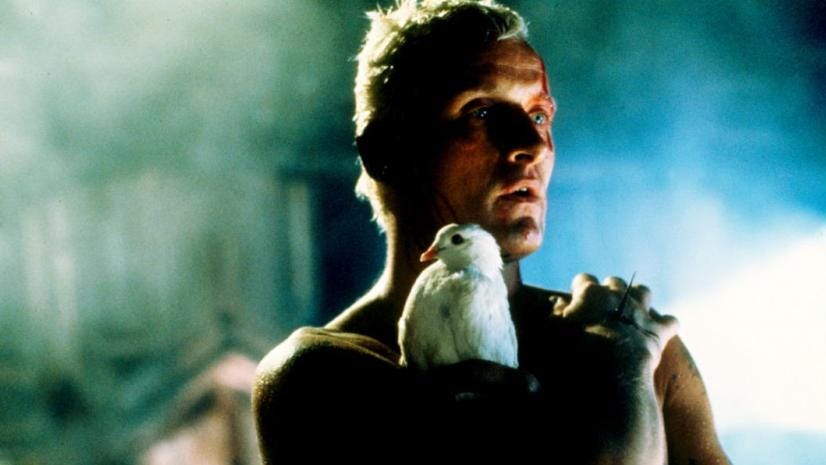“I've seen things you people wouldn't believe. Attack ships on fire off the shoulder of Orion. I watched C-beams glitter in the dark near the Tannhäuser Gate. All those moments will be lost in time, like tears in rain. Time to die.”
Rutger Hauer likely had no idea he was presenting humanity with its own perfect eulogy when he said those words. According to Ridley Scott and screenwriter David Peoples, Hauer made several last-minute changes to the soliloquy he was about to deliver on the set of Blade Runner.
The original text of the monologue, though about the same length, included a few more oblique references to the film’s universe. Roy Batty was to have watched “C-beams glitter” from “on the back decks of a blinker.” The burning attack ships were to be described as “bright as magnesium.”
Hauer removed much of this, describing it as “opera talk,” adding nothing to the film. And then he added “All these moments will be lost in time, like tears in rain.”
His delivery similarly struck the balance between the marvel of being human and the vast destructiveness of a world that has grown so violently beyond the limits of a single planet. Though the other replicants simply and understandably are afraid of dying, of having their short consciousness snuffed, Batty stands apart as a lifeform in deep and unrequited love with his ability to live.
Even the manner in which he says “tears in rain” is that of someone who has just discovered that he is able to come up with such a simple yet sublime metaphor. And though we’ve seen Batty do brutal and gruesome things to others throughout the film, we have also rooted for him as he spends his last moments thrashing against the inevitability of his own death. We have to regard the unfairness of seeing his consciousness slip away while the world that teased him with it gets to continue.
Of course, that world isn’t continuing. It’s ending. At the time of Blade Runner’s release the idea that a society would so willfully and cruelly design itself into its own doom was a controversial one. Words like “cyberpunk,” “global warming” and “neoliberalism” were still only edging into wide consciousness.
The film flopped at the box office. Years and decades were spent re-cutting it. Scott rightfully knew he was on to something with Blade Runner, but finding the right way to end and tell the story, the perfect way to articulate the something, was a challenge.
We know very well what he was onto now. In 1982, viewers still had to imagine such a bleak world. Today we are seeing it converge into reality. David Harvey and others have spent years saying that this future is more or less in the DNA of the contemporary city. To walk around Los Angeles, a city of obscene wealth and inequality exposed to increasingly hostile elements, that rapidly shifts between development and neglect and decay, still grasping in vain to convince anyone who will listen that it contains the seeds of an unlikely future, is to see this premonition borne out.
And so we have caught on. Blade Runner is a classic. One of the greatest films ever made. And in no small part due to the performance of the now late Rutger Hauer. Our own short memories have had Batty’s dying soliloquy etched into them because, past all the pollutants we have shoved into them, we know when we are seeing something purely and magnificently human.
We too have seen things we wouldn’t believe. Whole cities flooded and burned simultaneously. Gargantuan glaciers come apart like a child’s sand castle in the wind. We know that we’ve created what we’re seeing and can’t help but marvel at the raw obliteration we are capable of unleashing. Even by accident.
We have, in that recognition, attempted to replicate it. To convince ourselves that we can push our collective human awareness past extinction. In so many other films and books and TV shows that populate the glut of 21st century sci-fi. We have even made a sequel which, unlike its predecessor, was a notable success at the box office.
But Blade Runner: 2049 was not the accurate sequel. It never could be. The only sequel worthy of the original would by its nature have to be far simpler. And by dying the same year as Batty, Hauer managed to achieve it in a haunting, terrifying, heartbreaking way.
He reminded us that mortality isn’t a fantasy, or a plot device rendered by a unique and versatile actor. That sapient beings will die. Are dying. Are being killed by forces we created but are now well beyond our control.
Fair? It’s never a question of fairness. Only of how we ultimately fit in with the same cosmic logic that leaves all of us in awe.



